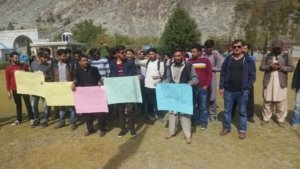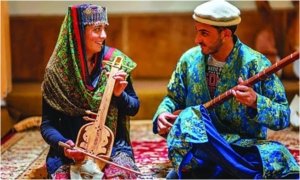By Sultan Abbas

After the incidents of Punjab University and Peshawar University recently the vigilantism has reared its ugly head in Karakoram International University Gilgit. The debate over women’s participation in cultural activities has taken the social media by storm after performance of dance by some KIU girl students in a TV programme. It indicates the division in society over what constitutes the culture and norms of Gilgit-Baltistan. The social media is filled with debates around the ‘proper’ role of women in society and the nature of gender relations. A large cross-section of society believes that the dance performance by girls has tarnished GB’s culture and portrayed the women in obscenely negative ways. They maintain that women are not allowed in GB culture to dance, and they must secure the consent of their guardians to commit to such an act. They believe that their women’s behaviour is tied with their family honour as if women are eternally shackled to men who will decide what is appropriate and what is not good for them.
On the other hand, an equally large number of people with powerful arguments and voices believe in the equality of women and the foundational value they attach to freedom of choice for everyone. This group says that if men can dance in public without any consequence this right should also be given to women as a fair principle of justice. They also believe that without women’s full participation in all the spectrum of social activities a society can never truly attain freedom. To advance the cause of justice as well as to bring the society at par with the demands of modernity, this later group believes in absolute freedom of choice for the womenfolk.

To put both these viewpoints and the ensuing hot discussion in context lets briefly glance at GB’s social profile. Comprising of ten districts and adhering to four distinct interpretations of Islam, i.e. the Sunnis, the Shia, the Ismailis, and the Noorbakshis, the nearly two million population belong to ten different tribes and ethnic groups, some of whom claim European ancestry and others claim Arab descent. Despite this enormous scale of diversity, the people of GB have demonstrated remarkable cohesion in terms of their broader outlook on life and conceptions of what is a good life, what is the right thing to do and so on. Across GB we have evolved a culture of hospitality and honesty. For example, our diverse people have returned lost wallets in Hunza, in Ghizer, in Skardu, in Gilgit and also in Chilas on a number of occasions.
Historically the Gilgit city is a kaleidoscope of different communities with diverse language, ethnicity, and faith to live a largely peaceful life for much of its history, except an upsurge of sectarian hatred played out in last few decades. But the people have also demonstrated remarkable tolerance to reach out to each other for reconciliation. For example, following the Chilas and Lulusar massacre of bus passengers belonging to Shia community, delegations from Chilas arrived in Nagar to express solidarity with the bereaved families and to offer olive branches to reaffirm that those events were aberrations rather than the norm. Similarly, in the recent visit of His Highness the Aga Khan to GB, members of other faiths protected and looked after properties of the people traveling from Gilgit to Hunza for two days.
To cut a long story short I believe that there continue to exist a set of diverse opinions, sometimes at odds with each other, on the nature of gender relations in society, among others. The conception of what represents the proper role of women in society in Hunza is clearly different from that of what people believe to be true in Kashrote or Majini Muhallah on the same subject.

While I would tolerate differences of opinion but it was painful for me to notice a large swathe of highly educated people from different communities vilifying the people of Hunza and painting them with broad brushes as “the evil incarnate planted and working on western agendas”. Some even called for violent attacks. This is clearly an indication of extremist mindset which must be defeated if we are as a whole in GB to live together and achieve our common goals of peaceful development in the age of CPEC and climate change. I believe, our younger generation should not fall prey to retrogressive forces, which set wrong priorities and dissipate the youth’s energy on trivial matters. The enlightened youth must reject them all just like it was incumbent upon all of us to condemn school burning in Chilas, the Chief Secretary’s vile remarks in Skardu, the terrorism in Gilgit and so on. If we don’t do that we risk balkanisation of a highly mountainous society at the doors of a rising China which is not good for anyone.
I believe the people of GB need to learn the best things from each other and focus on real issues of our common oppression, colonial subjugation and marginalization in this age of geo-economic challenges. The space for enlightened debate must never be violated.
Summing up the discussion, I have a question to ask from the so-called guardians of women rights in GB and the moral police, do you want to become like the Kohistani tribals who killed three young women who clapped for a dancing cousin, or do you want your women to be beacons of light and progress like Malala Yousufzai, who globally campagins for education and girls’ rights to live a life of their own. If you want the former I cannot guide you, but if you want the later then you need to begin to tolerate the womenfolk’s God-given individuality, talent and reject a bunch of bigots who want to radicalise and instill fear in society.
The writer works in development sector, has studied Global Politics at London School of Economics and Social Science

The High Asia Herald is a member of High Asia Media Group — a window to High Asia and Central Asia
